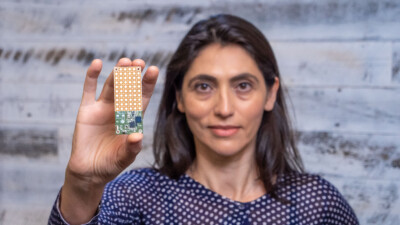Juniyali Nauriyal is CEO and co-founder of Photonect Interconnect Solutions, but she’s also a one-of-a-kind addition to the engineering space and a role model for women and people of color everywhere.

Becoming an engineer
Juniyali was raised in Dehradun, India, a northern city near the Himalayas. Her intrigue with engineering and science began with lessons of Albert Einstein and Isaac Newton. To her, they demonstrated, “A single person can create so much impact that even now, we are reading what they first thought about.” In high school, her father began bringing her to a public event called “Chai and Why?” where those who attended had their choice of Chai or another tea and sat to listen to whatever scientist had come to speak. These events dovetailed a growing love of science and engineering for the young Juniyali.
Soon she started watching shows about science and engineering marvels, slowly realizing she wasn’t as interested in the theoretical work her inspirations did so much as their ability to leave an impact. She was better suited to hands-on work. She walked past a bridge and wondered how it was made, not how gravity acted upon it.
Her curiosity about how things were made is what eventually drove her to the engineering field. “I always liked the thought of building something from scratch and not just reading about it,” she says. She went on to complete her undergraduate degree in engineering from MCT’s Rajiv Gandhi Institute of Technology, part of Mumbai University, before venturing on to the University of Rochester. There, she received a graduate degree in optics and completed a PhD thesis in the field of Integrated Photonics with Professor Jaime Cardenas.
This same professor would later co-found her company, based on their research in the photonics field. In simple terms, photonics is all about using light (photons) — how to create it, shape it, and put it to work in technologies like communication, sensing, and imaging.
Building Photonect
Though her path to founding Photonect was not as easy as it may appear. To attend the University of Rochester, Juniyali had to leave her support behind. She rebuilt her life from scratch before ever building a company. This was hard, she explains, “It was challenging being an international student, person of color, and also a female, to get into the field and actually build something from the ground up… I was not somebody whose parents were here who could guide me as I was building, I had to develop my own support system of a network of mentors and advisors who could help me.”
This was made even harder by the fact that Juniyali is a petite woman who has been mistaken for much younger than she is more than once. She admits, “[People] always think I’m a kid.” But she wasn’t a kid. She, through her research into connecting fibers to chips with low loss, had identified a need and was looking to build a company to fulfill it. Unfortunately, this task was made more difficult by an astounding lack of role models within the industry.
“Being a female, when you don’t look old and you’re starting a company, it’s hard, but it was also very difficult to find similar-looking people in the positions where I wanted to be. This industry is very male-dominated. And yes, there are a lot of Indians in the field who are male at higher positions, but I could not see a female startup entrepreneur in the field whom I could look up to and actually see that that is possible.” There was no example for Juniyali, so she had to become the example herself.
Through perseverance and the support of the network she crafted in her years at the University of Rochester, Juniyali was able to create Photonect Interconnect Solutions; a company focused on sustainability, diversity, and the future of photonics.
Prioritizing diversity in the workplace
Although it’s not part of the official tagline, diversity has been an integral part of her company from its inception. Rochester’s resources and help from people with a shared interest in her work is how she was able to hire herself full-time after graduating. Now, she carries that energy forward in her company with how she hires and conducts her team. The small team varies in age, race, and background.
When asked about her interviewing process, Juniyali said, “Diversity is definitely a consideration…we’ve always paid attention to how we can be more proactive in reaching out to different types of all the sectors and being as diverse as possible… having no bias while we interview, and just purely based on skills and their outlook, making a decision.”
To her, diversity changes a team for the better: “I think it’s super important to have a diverse team in engineering and research projects, because the background or how people grew up impacts and influences how they make decisions…there are ideas that you only get once you have really contrasted and diverse individuals in a team. Then you can listen to everybody’s feedback, because everybody brings great ideas and new thoughts into the company.”
Juniyali values her team and does her best to support them like she was supported in Rochester. They have weekly lunches with a focus on collaboration, and annual reviews that pinpoint what success means to them beyond their role at the company. She believes, “My priority as their CEO is to help them develop, not just at Photonect but wherever they are in their career. I want to make sure that every day they learn something new, and they keep growing.”
The future of Photonect
The Photonect team’s overall goal is to see photonics everywhere. Openly cautious about its repercussions for the next generation, Juniyali leads her company with sustainability in mind, but with the main goal of “photonics” being a household term.
She hopes to see photonics-based cell phones and photonics-based laptops. “I want to make consumer photonics a thing as compared to consumer electronics, and that is what I think is the future of photonics. Not just somewhere in a data center, but we want it more widespread and approachable to everybody.”
With Photonect’s technology of packaging the fibers to chip, the cost of their devices is almost on par with the packaging cost of an electronic circuit. So, while photonics does raise sustainability questions — like energy-hungry fabrication, scarce materials, and tough recycling — the company has set out to tackle these head-on.
“It’ll be a long process, but in a few years, I can see the industry working together. It would not be that you completely get rid of electronics. No, it would be a co-existing partnership between electronics and photonics, and you would see it in consumer devices as well.”
With her eye on success, driven by dedication and the desire to echo the impacts of greats like Einstein and Newton, Juniyali became a role model for a whole new generation. Maybe one day she’ll be a household name herself.
If you want to stay updated on her or Photonect’s journey, you can follow her on LinkedIn or visit the Photonect site: photonectcorp.com.




